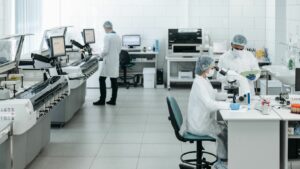”
Key Takeaways
- Integration of Disciplines: Industrial pharmaceutical science combines chemistry, biology, and engineering to innovate drug formulations and optimize pharmaceutical production processes.
- Rigorous Drug Development: The drug development process involves multiple phases, including preclinical studies and three phases of clinical trials, each crucial for assessing safety and efficacy.
- Quality Control and Assurance: Effective QC and QA processes are vital for ensuring that pharmaceuticals meet safety standards, reducing the risk of defects and contamination.
- Technological Advancements: Innovations such as automation, AI, and continuous manufacturing are transforming industrial pharmaceutical science, improving efficiency and drug discovery timelines.
- Evolving Regulations: Adaptation to changing regulatory guidelines is essential for compliance and successful market entry, especially with the growing focus on personalized medicine.
- Emerging Market Opportunities: Industrial pharmaceutical science is increasingly focusing on emerging markets, driven by rising healthcare demands and the pursuit of affordable medication solutions.
Industrial pharmaceutical science plays a crucial role in the development and manufacturing of medications that improve health outcomes worldwide. This field combines chemistry, biology, and engineering to create innovative drug formulations and ensure their safe production at scale. As global health challenges evolve, the importance of efficient pharmaceutical processes becomes ever more apparent.
With advancements in technology and a growing emphasis on personalized medicine, industrial pharmaceutical science is at the forefront of transforming healthcare. Professionals in this field work tirelessly to optimize drug delivery systems and enhance the efficacy of treatments. Understanding these processes not only sheds light on how medications are made but also highlights the ongoing efforts to make healthcare more accessible and effective for everyone.Industrial Pharmaceutical Science
Industrial pharmaceutical science encompasses the study and application of principles aimed at the discovery, development, and manufacturing of pharmaceuticals. This field integrates various scientific disciplines to innovate drug formulations and optimize production processes.
Definition and Scope
 Industrial pharmaceutical science defines the systematic approach to drug development and manufacturing. This scope includes research and development (R&D), regulatory compliance, quality control, and effective formulation techniques. It involves collaboration among chemists, biologists, engineers, and regulatory experts to ensure medications meet safety and efficacy standards. With the advent of biotechnology and nanotechnology, the field continuously evolves, addressing varying healthcare needs and enhancing drug delivery systems.. Industrial pharmaceutical science plays a critical role in improving healthcare outcomes. It ensures the availability of safe and effective medications for various health conditions. Through rigorous R&D processes, it enables the rapid response to emerging health challenges and supports the advancement of personalized medicine. Efficient manufacturing processes reduce production costs and enhance supply chain management. This accessibility leads to improved patient adherence and better overall health outcomes, thus underscoring the significance of this field in the modern healthcare landscape.
Industrial pharmaceutical science defines the systematic approach to drug development and manufacturing. This scope includes research and development (R&D), regulatory compliance, quality control, and effective formulation techniques. It involves collaboration among chemists, biologists, engineers, and regulatory experts to ensure medications meet safety and efficacy standards. With the advent of biotechnology and nanotechnology, the field continuously evolves, addressing varying healthcare needs and enhancing drug delivery systems.. Industrial pharmaceutical science plays a critical role in improving healthcare outcomes. It ensures the availability of safe and effective medications for various health conditions. Through rigorous R&D processes, it enables the rapid response to emerging health challenges and supports the advancement of personalized medicine. Efficient manufacturing processes reduce production costs and enhance supply chain management. This accessibility leads to improved patient adherence and better overall health outcomes, thus underscoring the significance of this field in the modern healthcare landscape.
Key Components of Industrial Pharmaceutical Science
 Industrial pharmaceutical science comprises several critical components that facilitate the development and manufacturing of effective medications. These components include the drug development process and quality control and assurance mechanisms.
Industrial pharmaceutical science comprises several critical components that facilitate the development and manufacturing of effective medications. These components include the drug development process and quality control and assurance mechanisms.
The drug development process involves several phases, each crucial for creating safe and effective pharmaceuticals. Initially, researchers identify and validate potential drug candidates through preclinical studies. Following this, clinical trials take place in three distinct phases to test safety and efficacy in human subjects.
- Phase I: In this phase, the drug is evaluated for safety and dosage in a small group, typically 20 to 100 healthy volunteers.
- Phase II: This phase assesses the drug’s effectiveness and further evaluates safety in a larger group, often ranging from 100 to 300 participants.
- Phase III: Involves extensive testing in thousands of patients to confirm effectiveness, monitor side effects, and compare the drug’s effectiveness to commonly used treatments.
After successful completion of these phases, manufacturers submit a New Drug Application (NDA) for regulatory approval. Approval signifies that the drug meets necessary safety and efficacy standards, allowing it to enter the market.
Quality Control and Assurance
Quality control (QC) and quality assurance (QA) serve as essential components ensuring that pharmaceutical products meet required standards. QC focuses on the operational techniques and activities designed to fulfill quality requirements. In contrast, QA encompasses the planned and systematic activities aimed at assuring quality throughout the production process.
- Raw Material Testing: Ensures that all incoming materials meet specifications prior to manufacture.
- In-Process Controls: Monitors production processes to maintain consistency and quality throughout each manufacturing stage.
- Final Product Testing: Validates the final products through rigorous testing for potency, purity, and efficacy before distribution.
Implementing robust QC and QA procedures reduces the risk of defects and contamination, ensuring that the end products are safe and effective for patient use. These mechanisms strengthen consumer trust and compliance with regulatory requirements, supporting the overall mission of improving public health outcomes.
Recent Trends in Industrial Pharmaceutical Science
Recent trends in industrial pharmaceutical science focus on technological innovations and evolving regulatory frameworks shaping drug development and manufacturing processes.
Advances in Technology
Advances in technology significantly enhance industrial pharmaceutical science. Automation and robotics streamline manufacturing processes, increasing consistency and reducing human error. Technologies such as artificial intelligence (AI) and machine learning optimize drug discovery, enabling faster identification of potential drug candidates. Moreover, advancements in biotechnology facilitate the development of biologics and biosimilars, expanding the therapeutic options available in the market. Additionally, the introduction of continuous manufacturing techniques allows for more efficient production, improving supply chain resilience and responsiveness.
Regulatory Changes
Regulatory changes impact industrial pharmaceutical science, demanding adaptation from professionals in the field. The U.S. Food and Drug Administration (FDA) and other global regulatory bodies are increasingly adopting guidelines that encourage innovation while maintaining patient safety. Guidelines on the use of data analytics and real-world evidence streamline approval processes for new treatments and devices. Additionally, the focus on personalized medicine has prompted regulatory adaptations to assess the safety and efficacy of tailored therapies. Thus, staying compliant with these evolving regulations is crucial for manufacturers, ensuring that new products reach the market efficiently while adhering to safety standards.
Challenges in the Field
Industrial pharmaceutical science faces multiple challenges that impact drug development and production. Key obstacles include high drug development costs and the need for compliance with stringent regulations.
Cost of Drug Development
Cost barriers pose significant challenges in drug development. The average cost to bring a new drug to market ranges from $2.6 billion to $2.9 billion, influenced by lengthy research and development timelines. Each project may take over ten years from discovery to market, with only about 12% of drugs entering clinical trials receiving FDA approval. Budget constraints often limit innovative research, compelling companies to prioritize projects with higher likelihoods of success, potentially stifling breakthrough therapies. Increasing pressure on pricing due to healthcare costs further complicates profit margins, necessitating efficient resource allocation to sustain development efforts.
Compliance with Regulations
Compliance with regulations represents another critical hurdle. Pharmaceutical companies must navigate complex regulatory environments established by agencies such as the FDA and EMA. These regulations dictate standards for manufacturing, testing, and marketing of drugs. Failure to adhere to these stringent guidelines can result in hefty fines, product recalls, and damage to reputation. Continuous updates to regulations require companies to implement robust quality management systems and maintain thorough documentation processes. Furthermore, adapting to new compliance requirements for personalized medicine introduces additional complexity, underscoring the importance of staying informed about regulatory changes in a rapidly evolving landscape.
Future Directions in Industrial Pharmaceutical Science
Future directions in industrial pharmaceutical science emphasize advancements in personalized medicine and the exploration of emerging markets, both critical for enhancing healthcare accessibility and effectiveness.
Personalized Medicine
Personalized medicine focuses on tailoring treatments to individual patient needs, leveraging unique genetic, environmental, and lifestyle factors. Development of targeted therapies marks a significant shift in pharmaceutical strategy, allowing for precise interventions in disease management. Techniques such as genomics, proteomics, and metabolomics facilitate the identification of biomarkers, which aid in selecting optimal therapeutic options for patients. Collaboration between pharmaceutical companies and research institutions promotes innovative drug discovery and fast-tracks clinical trials through adaptive designs. Furthermore, advancements in data analytics and machine learning enhance patient stratification, improving the likelihood of treatment success, while regulatory frameworks are adapting to support the complexities of personalized medicine.
Emerging Markets
Emerging markets present significant opportunities for growth in industrial pharmaceutical science. Increasing demand for affordable healthcare, coupled with rising affluence in regions like Asia-Pacific, Africa, and Latin America, prompts pharmaceutical companies to explore these avenues. Companies can expand their reach through partnerships with local manufacturers, enhancing distribution channels and addressing regional health concerns. Investment in research and development tailored to common diseases prevalent in these markets ensures relevant and effective product offerings. Additionally, fostering collaborations with governments and healthcare organizations can promote regulatory alignment and streamline the market entry process, ultimately contributing to improved healthcare access in underserved populations.
Industrial pharmaceutical science stands at the forefront of healthcare innovation. Its integration of various scientific disciplines ensures the development of safe and effective medications. As the field evolves with technological advancements and personalized medicine, it continues to address emerging health challenges.
The commitment to quality control and regulatory compliance remains paramount. This dedication not only enhances patient trust but also facilitates the rapid introduction of new therapies. By embracing collaboration and adapting to market demands, industrial pharmaceutical science plays a crucial role in making healthcare more accessible.
Looking ahead, the focus on personalized medicine and emerging markets promises significant growth. This evolution will further improve global health outcomes, ensuring that tailored treatments reach those who need them most.



